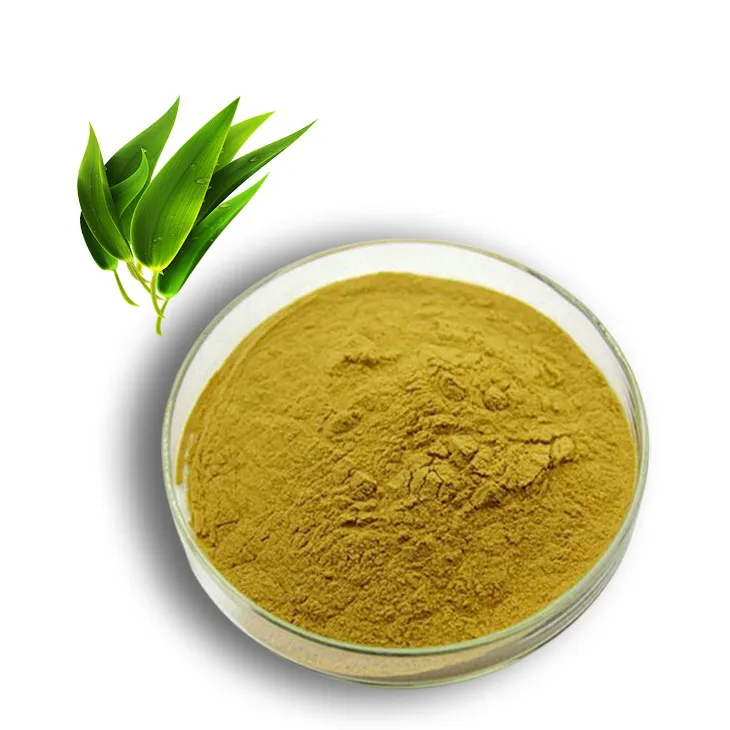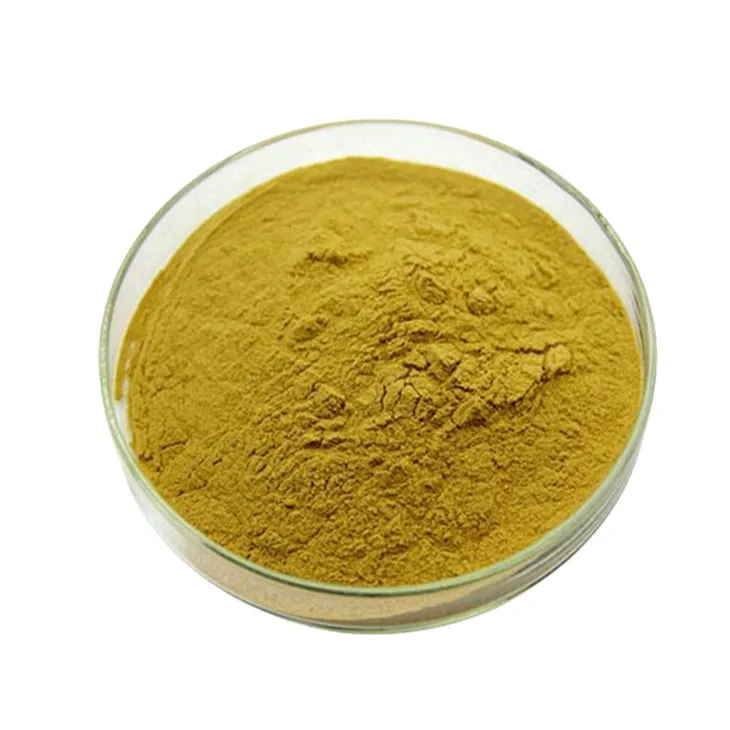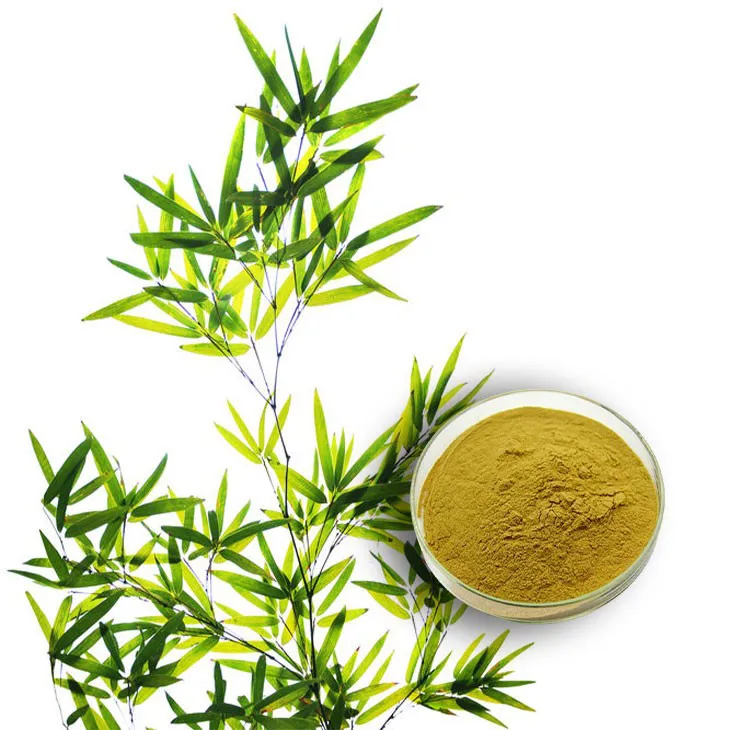- 0086-571-85302990
- sales@greenskybio.com
Bamboo Leaf Extracts: Their Production Methods and Reasons for Their Popularity
2024-12-11

1. Introduction
Bamboo, a plant known for its rapid growth and versatility, has been an important part of human life for centuries. In recent years, Bamboo Leaf extracts have emerged as a highly popular product in various fields. This article aims to explore the production methods of Bamboo Leaf extracts and the factors contributing to their widespread popularity.

2. Production Methods of Bamboo Leaf extracts
2.1 Selection of Bamboo Leaves
The first step in the production of bamboo leaf extracts is the careful selection of bamboo leaves. Not all bamboo leaves are suitable for extraction. High - quality bamboo leaves are typically sourced from healthy bamboo plants, preferably those grown in clean and unpolluted environments. The age of the leaves also matters. Usually, mature leaves are chosen as they tend to contain a higher concentration of the desired compounds.
2.2 Cleaning and Pretreatment
Once the leaves are selected, they need to be thoroughly cleaned to remove any dirt, debris, or contaminants. This can be done using gentle washing techniques. After cleaning, pretreatment steps may be involved. These can include drying the leaves to a certain moisture level. Drying can be achieved through natural air - drying or using low - temperature drying equipment to preserve the integrity of the active components in the leaves.
2.3 Extraction Techniques
- Solvent Extraction: One of the most common methods is solvent extraction. In this process, a suitable solvent, such as ethanol or water, is used to extract the active compounds from the bamboo leaves. The leaves are soaked in the solvent for a specific period, and then the mixture is filtered to obtain the extract. Solvent extraction can be effective in isolating a wide range of bioactive substances present in the bamboo leaves.
- Supercritical Fluid Extraction: This is a more advanced extraction technique. Supercritical fluids, such as supercritical carbon dioxide, are used. The supercritical fluid has properties between those of a gas and a liquid, which allows it to penetrate the cellular structure of the bamboo leaves more efficiently. This method is often preferred when a higher purity of the extract is desired, as it can selectively extract specific compounds without leaving behind harmful residues.
- Ultrasonic - Assisted Extraction: Ultrasonic waves are applied during the extraction process. The ultrasonic energy creates cavitation bubbles in the solvent, which helps to break down the cell walls of the bamboo leaves more effectively. This results in a faster and more efficient extraction of the active components. It also reduces the extraction time and the amount of solvent required compared to traditional extraction methods.
2.4 Purification and Concentration
After the extraction, the obtained extract may contain impurities. Purification steps are necessary to remove these unwanted substances. This can involve techniques such as filtration, centrifugation, or chromatography. Once purified, the extract may be concentrated to increase the concentration of the active compounds. Concentration can be achieved through evaporation of the solvent under controlled conditions.
2.5 Quality Control
Throughout the production process, strict quality control measures are implemented. This includes testing the raw materials (bamboo leaves) for contaminants, ensuring the proper functioning of the extraction and purification equipment, and analyzing the final extract for its composition and purity. Quality control also involves compliance with relevant industry standards and regulations to ensure the safety and effectiveness of the bamboo leaf extract.

3. Reasons for the Popularity of Bamboo Leaf Extracts
3.1 Health - Promoting Properties
- Antioxidant Activity: Bamboo leaf extracts are rich in antioxidants such as flavonoids. These antioxidants play a crucial role in neutralizing free radicals in the body. Free radicals are unstable molecules that can cause damage to cells and are associated with various diseases, including cancer, heart disease, and aging - related disorders. By scavenging free radicals, bamboo leaf extracts can help protect the body's cells and tissues, thereby promoting overall health.
- Anti - Inflammatory Effects: The extracts have been shown to possess anti - inflammatory properties. Inflammation is a natural response of the body to injury or infection, but chronic inflammation can lead to many health problems. Bamboo leaf extracts can help reduce inflammation by inhibiting the production of inflammatory mediators in the body, making them potentially useful in the treatment of inflammatory conditions such as arthritis.
- Cardiovascular Health: Some studies suggest that bamboo leaf extracts may have a positive impact on cardiovascular health. They may help in reducing blood pressure, improving blood lipid profiles (such as reducing cholesterol levels), and preventing the formation of blood clots. These effects are attributed to the presence of certain bioactive compounds in the extracts that interact with the cardiovascular system in beneficial ways.
- Antimicrobial Activity: Bamboo leaf extracts have demonstrated antimicrobial activity against a variety of bacteria, fungi, and viruses. This makes them potentially useful in the development of natural antimicrobial agents for use in food preservation, personal care products, and medicine. The antimicrobial properties can help prevent the growth of harmful microorganisms, reducing the risk of infections.
3.2 Wide Applications in Different Industries
- Food and Beverage Industry: In the food and beverage industry, bamboo leaf extracts are used as natural flavorings and preservatives. They can add a unique flavor to products such as teas, juices, and baked goods. Their antioxidant and antimicrobial properties also make them ideal for extending the shelf life of food products without the need for synthetic preservatives.
- Pharmaceutical Industry: Due to their health - promoting properties, bamboo leaf extracts are being investigated for their potential use in pharmaceuticals. They could be developed into drugs or dietary supplements for the treatment or prevention of various diseases. For example, their anti - inflammatory and antioxidant properties may be harnessed in the development of new medications for chronic diseases.
- Cosmetic and Personal Care Industry: Bamboo leaf extracts are finding increasing use in the cosmetic and personal care industry. They are added to products such as creams, lotions, and shampoos. Their antioxidant and anti - inflammatory properties can help protect the skin and hair from damage, improve skin elasticity, and reduce signs of aging. Additionally, their antimicrobial activity can keep the products free from microbial contamination.
3.3 The Growing Trend towards Natural Products
In today's society, there is a growing preference for natural products over synthetic ones. Consumers are becoming more aware of the potential risks associated with synthetic chemicals in food, medicine, and personal care products. Bamboo leaf extracts, being natural products, are perceived as a safer and more sustainable alternative. They are derived from a renewable plant source (bamboo), which is abundant in many parts of the world. This aligns with the increasing demand for environmentally friendly and sustainable products.

4. Conclusion
Bamboo leaf extracts have become popular due to their sophisticated production methods that ensure high - quality extracts and their numerous benefits. Their production involves a series of steps from leaf selection to extraction, purification, and quality control. The reasons for their popularity lie in their health - promoting properties, wide applications in different industries, and the overall trend towards natural products. As research on bamboo leaf extracts continues, it is likely that their applications will expand further, and they will continue to gain more recognition in the global market.

FAQ:
Q1: What are the main steps in the production of bamboo leaf extract?
The production of bamboo leaf extract mainly includes careful selection of bamboo leaves first. High - quality and fresh bamboo leaves are usually preferred. Then, advanced extraction techniques are employed. These may involve methods such as solvent extraction, where appropriate solvents are used to draw out the active components from the bamboo leaves. After extraction, purification and concentration steps are often carried out to obtain a more refined and potent bamboo leaf extract.
Q2: What health - promoting properties does bamboo leaf extract have?
Bamboo leaf extract is known to have antioxidant properties. Antioxidants in it can help neutralize free radicals in the body, which may reduce oxidative stress. It may also have anti - inflammatory effects, potentially helping to soothe inflammation in the body. Additionally, some studies suggest that it could have certain effects on cardiovascular health, such as helping to regulate blood lipid levels.
Q3: In which industries is bamboo leaf extract widely used?
Bamboo leaf extract is widely used in the food industry. It can be used as a natural additive to provide certain health benefits and flavor to food products. In the pharmaceutical industry, it is being studied for its potential medicinal properties and may be used in the development of new drugs or health supplements. The cosmetic industry also utilizes bamboo leaf extract as it may have beneficial effects on skin health, such as antioxidant and anti - aging effects.
Q4: Why is the trend towards natural products contributing to the popularity of bamboo leaf extract?
Consumers are increasingly aware of the potential side effects of synthetic products. Natural products like bamboo leaf extract are generally perceived as safer and more in line with a healthy lifestyle. People are more willing to choose products containing natural ingredients, and bamboo leaf extract, being a natural extract, meets this demand. It also offers a unique set of properties that are not easily replicated by synthetic substances.
Q5: Are there any regulations regarding the production of bamboo leaf extract?
Yes, there are regulations. In the food industry, for example, the production of bamboo leaf extract as a food additive must comply with food safety regulations regarding purity, safety, and proper labeling. In the pharmaceutical and cosmetic industries, there are also strict regulatory requirements for quality control, manufacturing processes, and product safety to ensure that the bamboo leaf extract used meets the necessary standards.
Related literature
- Bamboo Leaf Extract: A Review of Its Phytochemistry and Biological Activities"
- "Production and Applications of Bamboo - based Natural Products"
- "The Health Benefits of Bamboo Leaf Extract: An Overview"
- ▶ Hesperidin
- ▶ Citrus Bioflavonoids
- ▶ Plant Extract
- ▶ lycopene
- ▶ Diosmin
- ▶ Grape seed extract
- ▶ Sea buckthorn Juice Powder
- ▶ Fruit Juice Powder
- ▶ Hops Extract
- ▶ Artichoke Extract
- ▶ Mushroom extract
- ▶ Astaxanthin
- ▶ Green Tea Extract
- ▶ Curcumin
- ▶ Horse Chestnut Extract
- ▶ Other Product
- ▶ Boswellia Serrata Extract
- ▶ Resveratrol
- ▶ Marigold Extract
- ▶ Grape Leaf Extract
- ▶ New Product
- ▶ Aminolevulinic acid
- ▶ Cranberry Extract
- ▶ Red Yeast Rice
- ▶ Red Wine Extract
-
Shikone Extract
2024-12-11
-
Curcuma Longa Extract/Turmeric extract
2024-12-11
-
Baicalin
2024-12-11
-
Angelica sinensis extract
2024-12-11
-
Phyllanthus Emblica Extract
2024-12-11
-
Camu Camu Extract
2024-12-11
-
Hawthorn powder
2024-12-11
-
Kupilu Extract
2024-12-11
-
Lycopene
2024-12-11
-
American Ginseng Root Extract
2024-12-11





















